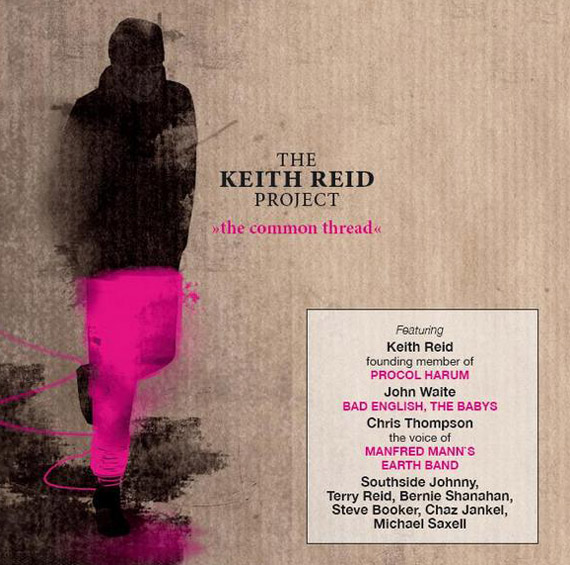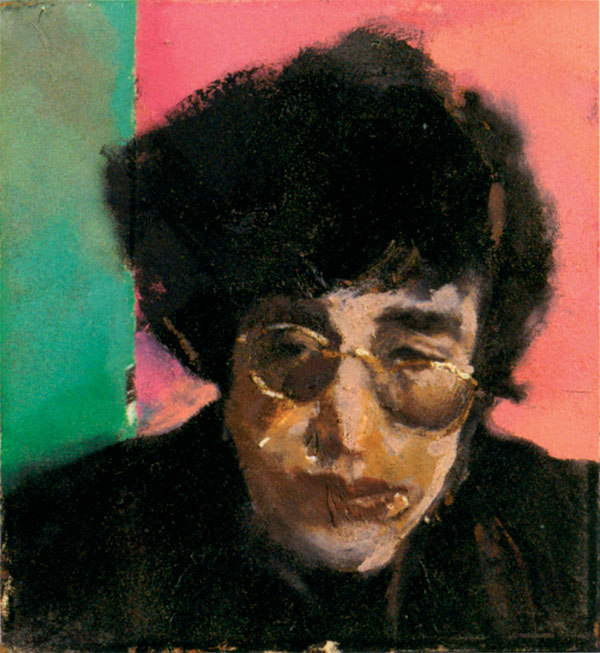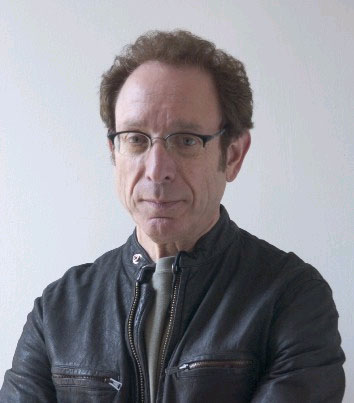Keith Reid interview, May 2010
 Dmitry
M. Epstein MA is a professional rock-music critic, manager, producer
and lyricist, born in Belorussia, now living and working in Israel; he's also a
good friend of 'Beyond the Pale'. His Keith Reid interview runs as follows:
Dmitry
M. Epstein MA is a professional rock-music critic, manager, producer
and lyricist, born in Belorussia, now living and working in Israel; he's also a
good friend of 'Beyond the Pale'. His Keith Reid interview runs as follows:
When it comes to rock poetry namechecked are the usual suspects, but it's not
that often you hear such names as Tim Rice and Bernie Taupin or Pete Sinfield
and Keith Reid who, in rock's golden era, came up with memorable words and
images which etch themselves in the listener's mind for ever. It was Reid who
created the darkly-hued story of strange occurrence in some pub that everybody
knows as A Whiter Shade of Pale, and it's his lyrics, together with Gary
Brooker's music and voice, that have been driving PROCOL HARUM for more than
forty years now. With the band's classic catalogue re-issued last year and Keith
having come up with an album
of his own, The Common Thread, it's quite a time to exchange some
words with the enigmatic man.
Dmitry M Epstein
Keith, you don't think of yourself as a poet, although your verses work great
even without a tune. But where do you think the line goes between poetry and
songwriting?
 Keith
Reid
Keith
Reid
Writing a poem is totally different to writing the words for a song (see also
here). When you
write a poem you are thinking of the poem being read. You may also think of the
poem being spoken. But you don't think that it is going to be set to music and
sung. When you write the words for a song, you know that they are going to be
set to music, and sung. Therefore, the considerations of what will make a poem
work, and what will make a song work, are very different. A poem should be
complete in itself when you read it. The words for a song may not look good on
paper, but as long as they communicate when you hear them, then you have done a
good job. I always try and make the words for my songs sound poetic and have a
lot of meaning, but I never think of them as being poems. I think of them more
as my statements. Someone who wrote about me said that "I have a poet's heart":
I would like to think that is true.
Does PROCOL HARUM's Pilgrims Progress
depict a songwriting process?
Pilgrim's Progress is exactly depicting the process of writing of that
particular song.
Do you take the phonetical aspect into
consideration when writing a song?
I just go with my instincts. If it sounds good to me, I do it. I don't think
there are any rules when it comes to writing songs. It's like Little Richard
said, "A Whop Bam A Luma, A Lam Bam Bush" something like that anyway!
Do you write PROCOL songs with Gary's voice in
mind? I mean some singers find it hard to finish a line with a certain sound,
like "ee"...
The only question in my mind when I write songs is, "What am I trying to say?
Is it worth saying? And have I found the best words to say it?"
Writing a song, do you imagine what it'll end
up like in terms of tune or tempo?
I think it's better not to imagine the tune or tempo. I want to hear a tune
or tempo I could not imagine. That's why I write with other people.
Some of your lyrics feel a bit surrealistic.
Is there a song that even you can't remember what it was about?
I love surrealist imagery. I used it a lot in my early songs, Homburg
for example: "The mirror on reflection has climbed down from the wall". I don't
use it too much now, I go for a more conversational style of writing but still
try to be poetic. This can be quite hard to achieve. But I can definitely
remember what all the songs were supposed to be about, I just can't remember all
of them and have to be reminded.
Looking back on the last four decades, do you
think you've achieved what you set your sights on back in the Sixties?
I think in artistic terms I achieved quite a lot in the Sixties and
Seventies. But I think since 1986, when I went to live in New York City, I
became a much better songwriter, and I think the words for The Keith Reid
Project are some of my very best work. I still think I'm capable of achieving a
lot more. And I intend to!
After so many years in the business, why was
it only recently that you came up with The Keith Reid Project? Why now? Are
you're taking stock of what you've done?
Going to New York City in 1986 was the first time I had worked outside of
PROCOL HARUM. I met a lot of good musicians, and singers and songwriters. I
started to write differently and feel differently. I became more
story-orientated and more character-driven. And I started to write more about
what was going on outside of me. Eventually, I built up a body of work, and The
Keith Reid Project is the first volume of this new writing. I would like to do
some more.
How did you choose the artists for The
Common Thread? Were most of the songs recorded especially for the project?
The songs chose the artistes in a number of ways. The John Waite songs were
written with him and there's no way you're going to find a better singer.
Southside Johnny was just visiting us at the studio, he heard the song A
Common Thread, which I was writing with Matt Noble, and volunteered to sing
it. We just set up a mic and he recorded it first take. Absolutely perfect!
Bernie Shanahan is a friend of mine from New York, a great singer, and I just
thought his voice was right for Potters Field and Venus Exploding.
So that's the way it went, I had some songs recorded, and when Manfred at
Rockville [label] asked me to do the record, I finished the songs I already had,
and added some more. There were about twenty to choose from and it was quite
hard to decide what to include and what to leave out.
Who chose the instrumentalists for the album
you or the vocalists?
 Some
of the instrumentalists like Jeff Golub, for example, I wrote Gold Fever
with him and John Waite. So, of course, Jeff being an amazing guitarist played
on the recording. The Heartbreak House was originally done with just
acoustic guitar and voice, with Michael Saxell. But I wanted to rock it out, so
I went to a studio in New Jersey with a friend of mine, told him what I wanted
and we rocked that tune out!
Some
of the instrumentalists like Jeff Golub, for example, I wrote Gold Fever
with him and John Waite. So, of course, Jeff being an amazing guitarist played
on the recording. The Heartbreak House was originally done with just
acoustic guitar and voice, with Michael Saxell. But I wanted to rock it out, so
I went to a studio in New Jersey with a friend of mine, told him what I wanted
and we rocked that tune out!
Don't you think the album, as great as it is,
came off a bit too varied stylistically?
I don't know if the album is too varied stylistically. I come from the school
of not wanting every track to sound the same. I come from a time when you used
to put a record on the turntable, listen to side one, turn it over and listen to
side two. So it was like a film with a beginning, a middle and an end. I like
variety in music.
Your name takes the first place in the credits
for the Thread songs, just like it was when you were co-writing with
everyone other than Gary Brooker. Why is it so with him if the words come first?
When I was writing with only Gary Brooker, his name came first because,
alphabetically, B comes before R. Although, of course, the words were written by
me, before he wrote the music. Now I work with different writers on many
different songs, so it makes more sense for my name to come first.
How did your collaboration with Chris Thompson
come about?
I met Chris Thompson in a studio in London. He called me a few days later to
see if I would like to write the words for a song he was working on. That was
the first time I really worked outside of PROCOL HARUM, and that song was
You're The Voice.
What did you do in a studio in the Eighties,
if PROCOL didn't exist then?
I was doing some writing with Robin Trower for an album at that time. And it
happened to be the same studio that Chris was working in.
Was it you who suggested Frankie Miller who
you managed should work with Robin Trower or vice versa, was it Robin?
I met him after he worked with Robin, I didn't know him before.
Why do you think Frankie didn't become a star
of the calibre he deserved?
Frankie Miller is without doubt one of the most authentic singers I ever
heard or worked with. That certainly makes him a star in my book. I never met a
musician who heard him, who didn't love his voice!
How many albums will be released in The Keith
Reid Project series and which artists are going to involved in the next volume?
I don't know how many volumes, I just know I want to do another one. It will
be some of the same people as the first, and some new ones. I'm really looking
forward to doing it!
With some work on the side, what's so special
about your co-writing with Brooker that it's been going for more than four
decades?
I don't write songs with Gary very much now, so it's always special when we
do.
If your lyrics come before Gary's melodies,
does it mean sometimes the words have to be changed?
I hardly changed any of the words to the songs I gave to Gary. Perhaps, a
word here and there, but very little.
Does Brooker ever surprise you by what he's
doing with your words like bending a line in the middle: "My Prussian-blue
electric clock's / alarm bell rings"?
 Sometimes
I have been surprised, but I think that's a good thing. I remember being
surprised by A Salty Dog.
Sometimes
I have been surprised, but I think that's a good thing. I remember being
surprised by A Salty Dog.
A nautical theme is featured prominently in
many of your lyrics. Were you obsessed with sea as a child?
I have always loved being by the sea. For me that's my spiritual home. I also
like to be on the sea, I love to go sailing. My dream would be to live by the
sea.
Do you think of songs in terms of an album
when they come from a certain space and time to explore a certain subject such
as the death theme of "Home"?
I never have a theme before I start writing an album. It's only when the
record is finished and I have some distance from the songs that I realise what
the theme is. I think it's a subconscious process.
Did Gary ever ask you what a song is about?
He never asked me what any of the words meant, and that may have been the
secret of our success!
Don't you think the group's lasting success is
due to the ensemble being a vehicle for songwriting, not vice versa?
Without the songs, PROCOL HARUM would not have existed, and we wrote the best
songs we could. And we got the best musicians we knew to play them. STEELY DAN
would be another good example of that kind of group.
Did you ever ask Brooker to try and record a
full, four-verses version of A Whiter Shade?
No, I never did. In fact, he quite often sings three verses on-stage when he
performs it live.
You once said PROCOL HARUM basically were
created to record this song. Does it mean there'd have been no such band if you
didn't meet Gary?
I said that PROCOL HARUM was created to perform and record all the songs we
were writing, not just A Whiter Shade of Pale. But if I hadn't met Gary,
something else would have happened, as I was a man on a mission.
Does taking an active part in the
HARUM's Fortieth
Anniversary Series on Salvo Records make you
re-discover anything from your past or to look at it from a different angle?
The best thing about being involved with the Fortieth Anniversary was hearing
some songs I hadn't listened to in a long time, so it was almost like hearing
them for the first time. Like they were strangers. It was a good surprise.
How do you decide whether to present your new
work to Gary or any other singer?
That's not really a decision I've ever had to make. And it's not something I
would imagine ever being a problem.
Are there many lyrics in your archive that
haven't become songs?
I have quite a few lyrics that didn't become songs yet, but they will!
Do cover versions done by other singers, for
example Sarah Brightman's take on A Whiter Shade and A Salty Dog,
change a song lyrical perspective somehow?
It's always very interesting when I hear a different voice singing my words.
When it's a good singer it's like a good actor, they make it belong to them.
What do you do when you don't write if the
writing demands the table-sitting discipline from you?
When I'm writing I need to be very concentrated, no distractions, In one
place, searching inside myself. When I'm not working, I like to be outside,
moving around, in the fresh air.
Is there a song you, as established lyricist,
wish you'd written now?
My favourite song is
People Get Ready written by Curtis Mayfield. I'm just thankful he wrote
it.
 Dmitry
M. Epstein MA is a professional rock-music critic, manager, producer
and lyricist, born in Belorussia, now living and working in Israel; he's also a
good friend of 'Beyond the Pale'. His Keith Reid interview runs as follows:
Dmitry
M. Epstein MA is a professional rock-music critic, manager, producer
and lyricist, born in Belorussia, now living and working in Israel; he's also a
good friend of 'Beyond the Pale'. His Keith Reid interview runs as follows: Keith
Reid
Keith
Reid Some
of the instrumentalists like Jeff Golub, for example, I wrote Gold Fever
with him and John Waite. So, of course, Jeff being an amazing guitarist played
on the recording. The Heartbreak House was originally done with just
acoustic guitar and voice, with Michael Saxell. But I wanted to rock it out, so
I went to a studio in New Jersey with a friend of mine, told him what I wanted
and we rocked that tune out!
Some
of the instrumentalists like Jeff Golub, for example, I wrote Gold Fever
with him and John Waite. So, of course, Jeff being an amazing guitarist played
on the recording. The Heartbreak House was originally done with just
acoustic guitar and voice, with Michael Saxell. But I wanted to rock it out, so
I went to a studio in New Jersey with a friend of mine, told him what I wanted
and we rocked that tune out!  Sometimes
I have been surprised, but I think that's a good thing. I remember being
surprised by A Salty Dog.
Sometimes
I have been surprised, but I think that's a good thing. I remember being
surprised by A Salty Dog.